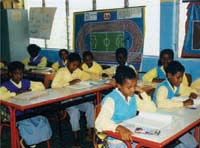Physiological factors
The physiological factors include how people feel, their physical health, and their levels of fatigue at the time of learning, the quality of the food and drink they have consumed, their age, etc.
Think of some physiological factors that are important when you try to study or learn something new for yourself.
Although everyone has a different pattern, most people need to feel safe and secure and not be hungry or tired. Many people are aware of the time of day they learn best — some at night, others early in the morning. It is a blend for each individual.
Physical health is important because ill health hampers learning, and so can fatigue. Studying for a long time can cause fatigue, which affects your audience's learning capacity. The time of learning also influences how much new knowledge is acquired. The quantity and quality of healthy food and drink also plays a crucial part because nutrition is responsible for efficient mental activity. Poor nutrition adversely affects learning. Alcoholic drinks and caffeine, as well as tobacco, all have an adverse effect on the capacity of people to learn. Good physiological factors promote effective learning.
People find it very difficult try to learn new things if they are in a difficult environment. Atmospheric conditions such as high temperature and humidity tend to lower mental efficiency. Studying in conditions of poor ventilation, the lack of proper lighting, where there is noise and physical discomfort, all hamper learning capacity. Good conditions make it easier to learn.

Imagine that you are teaching a family about the importance of environmental sanitation. What would you say about the following statements in regard to their effect on the effectiveness of your teaching? Which of the physiological factors are responsible for their effect on the learning process for each of the following?
- What if you are teaching the family at 2.00pm on a fasting day when they do not eat until the sun goes down?
- What if a member of the family is seriously ill?
- What if there are children in the house making a lot of noise?
- What if the room is very hot and hasn't got much air?
Poor learning could result from the following conditions:
- Lack of food and drink on a fasting day may affect the learning process, as good nutrition is necessary for efficient mental activity. If you do need to conduct a teaching session on a fasting day, make sure that it happens after the family has eaten.
- Physical health — an illness would hamper the learning process for the person who is ill, but also the rest of the family might be worried about that person and not be able to learn effectively. Put off your teaching until the person is recovered and the whole family can learn together.
- Perception — the noise from the children may affect the learning capacity of the audience. Try to include the children in your teaching session or make sure they can play safely away from the house.
- Atmospheric conditions — the non-ventilated and warm air conditions will make learning very difficult. Make sure that wherever you do your teaching there is fresh air and the temperature isn't too hot or too cold.